#I have no intelligent words for this
Explore tagged Tumblr posts
Text
getting all the education/degrees I can and planning so I can get the fuck out of this country >>>>
#🪷—faerie whispers#because I still don’t like these fucking ppl#done all that yip yapping in my ask box and these ppl still suck#idec who wins#I want out of this hellhole. bc were cooked either way#everybody voting for the wrong reasons anyways so who gives a fuck#I’ve been saving and I plan to get one more degree before I leave#I’ve been heavily considering Japan or Germany#there really isn’t shit here for me#ppl always say ‘wont you have to deal w racism/colorism?’#a cop yelled at me to move my truck out in front of a store even tho I’m on a cane and couldn’t walk far#black men literally have been ignoring and treating me like shit for my entire life since elementary school#trust me when I say nothing could be worse than what I’ve gone through#I’m ready to leave#we have no future under a capitalist society#and a government that no matter what prioritizes war and profit over ppl’s lives#I have no intelligent words for this#I’m truly tired#and for all the dumbasses who were pissed off at me for what I said in august#stay mad bc I have nothing for y’all either#y’all owe Palestinians an apology#they’re the main ones suffering from this ignorance#and we’re next
20 notes
·
View notes
Text



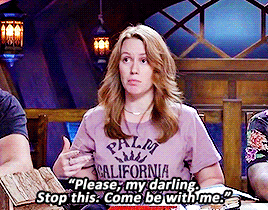
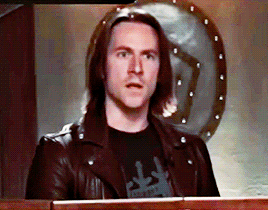
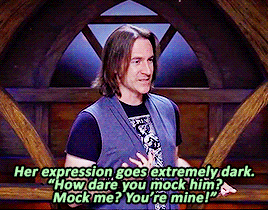
Her dead husband. I'm going to have his face. || Delilah and I have shared a brain for an incredibly long time. (for @sharkodactyl)
#critical role#criticalroleedit#marisha ray#matthew mercer#delilah briarwood#keyleth#keyleth of the air ashari#laudna#sylas briarwood#gifs#*#*cr#*parallel#*request#cr1#cr3#keyleth cr#laudna cr#r: keyleth x laudna#4h1m c1e100#2h5m c3e102#i didn't include the rolls bc i think it's clunky. but i DO think it's interesting!#keyleth failing deception = keyleth playing a shitty caricature of sylas; thinking his face with the wrong words will work#vs. delilah succeeding on the save = laudna giving a much more believable portrayal no deception needed#but it's delilah's intelligence that allows her to realize it's fake.#they've been sharing a mind for 30 years. sirens weewooweewoo in my brain!!!!#hope this is good natalie have fun with angry delilah trying to kill marisha ray!!
825 notes
·
View notes
Text
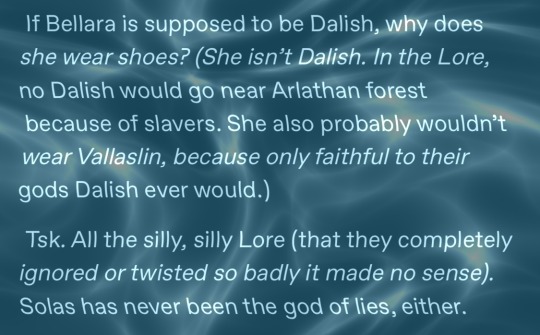
I should just block this poster bc everytime I see xyr post I get psychic damage
But on the other hand, how could I let myself miss out on “Bellara isn’t Dalish bc she wears shoes”
#look do I think fundamentally we should have gotten new world building for Northern Thedas elves#yes I do#Dalish clans being the outcome of the fall of the Dales etc#but this take is so out there#and this person won’t use words like idiot but WILL be condescending and fetishise intelligence and education so#and is generally so obnoxious about The Lore and patronisingly acting like nobody who liked VG could possibly be well read on Lore#I’m not even a big VG guy lol I have so many criticisms of it
163 notes
·
View notes
Text
god i fucking love the bravery mechanic in twewy!!!
it's such a genius way to handle gender locking equipment without anything actually being gender-locked. and i think it touches on something that is one; real, and two; a slice of the cultural atmosphere twewy was created in, like a lot of things in this game are. like, yeah you DO have to be braver to wear womens clothing generally, performing femininity has a higher barrier of entry, and especially so in 2007.
and i love love love the BRV requirements varying by brand/style as well, like yeah it DOES take a lot of bravery to wear gothic lolita. that for sure takes so much more courage than wearing a cheap solid colour t-shirt.
i'm of course never ever getting over joshua having the second highest base bravery after shiki, aka the highest of the guys, but more interesting than that to me is beat having the lowest. like. until post-game changes the relationship with brv as a stat, bravery = femininity, or at least comfort with with performing femininity. so shiki at 109 base BRV > joshua at 39 > neku at 14 > and beat at 4, is absolutely stellar characterization, for all of them. because it makes so so much sense, and it’s shown!
if BRV were purely “bravery” in the most literal sense with no relation to gender, then i wouldn't understand beat having a lower base stat than neku. i do not think there is a world where beat is less courageous than neku of day 1. but beat is ABSOLUTELY more MASCULINE than neku, what with his big boy machismo talk like “don't get your panties in a twist” and “you man up any yet? ‘cause i don’t believe in hittin’ women and children”. the idea of what a “man” is, something “strong”, something as far away as possible from “women” or “weakness”, is something incredibly important to beat! and that makes it known in his BRV stat! (and there is an irony in that. beat being tethered as he is to the ideal of masculinity and therefore strength, can’t equip the strongest threads without the most significant grinding of BRV…)
and of course the relationship BRV has with femininity largely falls apart with the appearance of post-game threads with absurd BRV requirements, but there’s still a little something to be said about the item with the highest BRV requirement in the game being one with a character-specific ability for joshua.
#there’s also something to be said about joshua’s relationship with femininity but i’ve yet to find the words#i deeply believe that the devs intended for him to be metrosexual#(at least)#and that’s the only intelligible thought i have on that right now#twewy#twewyposting#rambles#beat#ALSO ALSO. kariya telling beat to man up if he wants payback after ganking rhyme… and beat going on to tell neku to man up to fight HIM#man. :]
151 notes
·
View notes
Text

I need to go to sleep - I know I’m tired when I start over-annotating my sketches.
#is that the right use of the word ‘annotating’?#writer mutual don’t judge me I’m as intelligent as a kumquat#so much drarry#my heart is full#I have the best clients#love you all#mwah 💖#art#drawing#sketch#artists on tumblr#harry potter#doodle#drarry#art wip#Harry James potter#draco malfoy#hpdm#dmhp#harry x draco#ron weasley#sweet Ronald
407 notes
·
View notes
Text
shuake works because it feels like akechi's the only one who listens to akira and prompts the otherwise quiet leader to talk.
in a game about defiant teens making their voice heard, goro akechi listens to akira's voice from the get-go. out of detective-sleuthing/work duties, sure, but over time it's clear that akechi genuinely finds akira interesting.
in fact, akechi's confidant route regardless of which game is being played starts with him deeming akira the antithesis to his thesis, a "worthwhile debate partner". akechi values joker's opinions.
its always nice to see people point out that in that one 3rd sem phone call with akechi, its the most involved akira's been in a conversation in-game. i myself remember inserting a lot more input during that story-sequence which usually i can put on autoplay otherwise. akechi, in a whole different reality, still seeks out joker's opinions on it. it's like he trusts no one but him.
and imo this gives a lot of character to akira. he talks the most with akechi. the quietest people have the most on their minds, and it shows with akira. but akira never gets a say in anything, and who would listen? he's less than a nobody in reality since society dictated that. so he pointedly made himself silent, hiding his thoughts beneath an impenetrable mask. during important story moments, akira favors doing more than saying. his teammates and confidants are all directly inspired by his actions over the course of the game.
but with akechi, it's different. actions seem to take a backseat as they continue with their verbal back-and-forth. in rank 7 of royal, they play pool while talking, but it's clear to the outsider that the focus is in the layered conversation they're having. they primarily talk everytime akechi's in the coffee shop, because they dont usually see eachother in their busy schedules. it's not just "hi, hello, how are you?" with them but "i find you and everything you stand for interesting. let's talk more."
there's something to be said about how two people with vastly different and opposing views seek eachother out to further discuss things instead of antagonizing eachother. its why maruki said "despite being enemies, your relationship was never based on hatred or ill will".
their relationship was never a one-sided thing. akechi helps joker as much as joker helps him... arguably more. he eggs joker on, shows him that he can do better. otherwise, the leader would remain stagnant and unchallenged. there is no progress where there is no thesis and-- you can finish the rest.
#persona 5#shuake#goro akechi#akira kurusu#been defensively quiet lately and was thinking how nice it is to have someone listen to and validate my thoughts.#maybe not always agree but. making me feel like my words are worthwhile#aishi.docx#and then i realized thats exactly what akechi does with joker. damn rivals...#they should exist irl too...#oh to have a smug pretty n intelligent boyfriend telling me im smart while he twirls his spoon in the tea i made him...#anyway i really like the topic of joker's quietude cause i feel like it makes sense that he wasnt always like that at all.#him becoming quiet after getting shut down over and over is like. so humbling and a real epidemic i fear...#this is a personal post more than anything i feel HSJDBJS me giving joker my fears and pains. but actually joker copied ME#(said like a totally normal person)
742 notes
·
View notes
Text
Relationship envy except I envy the bond between iconic fictional characters Sherlock Holmes and Dr. Watson
#their relationship is so beautifully made#your honor they're everything to me#it doesnt even matter if you view them platonically or romantically#you cant deny the love they have for each other#the way that watson writes about holmes is just full of love and admiration#even though holmes doesnt express his feelings in the same way#he still loves him more than anything#as seen in 3GAR and DEVI#they both love each other so much#they both strengthen each other you see#they protect each other#they're a team#they each bring something unique to the table#but it doesnt feel like one is inferior to the other#at least not to me#traditional relationships always make me feel like someone is inferior/weaker than the other#holmes is smarter intellectually and he's stronger physically#but watson has the emotional intelligence#they balance each other perfectly#theyre PARTNERS in every sense of the word#and i want a relationship like theirs#i feel like traditional gender roles and stuff limit me from having a real relationship like this#as a girl#im expected to be weaker and softer#i mean even sherlock holmes says women are weaker#for gods sake#i feel like i will never achieve this level of equal partnership with a man#sherlock holmes#john watson#holmes/watson
127 notes
·
View notes
Text
TUMBLR WILL BE SELLING USER INFO TO AI
HEYY THIS IS IMPORTANT !!! please pleaseeeee toggle this:

you go to account -> blog settings -> scroll ALL the way down its at the very end
its questionable how much this will do but take every precaution !!!
go here to learn more
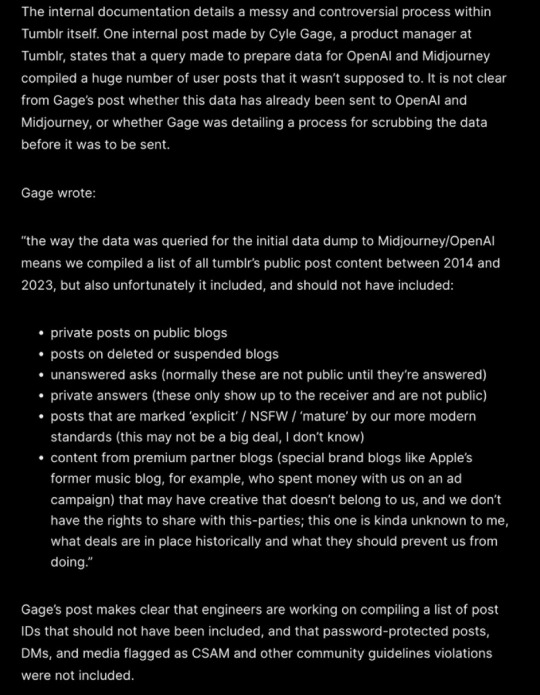
#tagging sbg bc thats where i have a lot of moots#sbg#school bus graveyard (webtoon)#school bus graveyard#sbg (webtoon)#no to ai art#no to ai generated images#artificial intelligence#ai generated#PLEASE DO THIS#SPREAD THE WORD
103 notes
·
View notes
Text
Well, at least Fukuzawa got his wish granted, I guess.... he's finally inside Fukuchi <3
#bungou stray dogs#bsd spoilers#bsd 120.5#please laugh i know i made myself laugh.... if only to keep from crying lol#the oocification of Fukuzawa will be studied in the history books for years to come#that's not my fukuzawa...... that's his discount twin fucksack#because his dick is so far up the ass of his dead pathetic dumbass crusty ex boyfriend it's not even funny#he is dickriding that fucker HARD#and here i thought the FANDOM woobified fukuchi out the wazoo. but oh my god no fukuzawa himself has them all beat this chapter#man is coco for cocopuffs and babying that grown-ass man like he's 5#it's truly pathetic and depressing to see i'm just beyond words#'you deceived him by keeping quiet the issues that would plague a union of mankind' NO??? LITERALLY ANYONE WITH A BRAIN WOULD KNOW#THAT THAT WOULD NEVER FUCKING WORK???? THAT IT'S THE STUPIDEST MOST NAIVE PLAN AND VIEW OF THE WORLD IMAGINABLE????#WHY ARE YOU ACTING LIKE THIS IS A TODDLER INSTEAD OF A GROWN-ASS SOLDIER WITH YEARS OF MILITARY EXPERIENCE#Fyodor feels like the only one at this point that hasn't truly lost the plot in all this...... the only one with a goddamn brain#I HATE THAT I HAVE TO AGREE WITH HIM!!!!!!!!! I HATE THAT IT FELT SO CATHARTIC!!!!!!!!!!!!#and i hate even more that the series clearly doesn't want us to agree with him and instead believe that fukuzawa is still right#even though he was spouting the most naive braindead bullshit imaginable that early series Fukuzawa would NEVER SAY#WHAT ABOUT YOUR CHILDREN BRO??? WHY DO YOU CARE MORE ABOUT DEFENDING THE HONOR OF THAT CRUSTY MF THAN#THE SAFETY OF YOUR KIDS????#WHERE DID ALL YOUR INTELLIGENCE GO#i fucking hated the writing ever since fukuchi's plan/motives were first revealed and it was played completely straight (and gay lol)#but to hear fukuzawa actually come out and defend that ridiculous bs is just.......... again i have no words#it's insane. what happened. what happened to you fukuzawa. all i can do is laugh it's so sad it's so stupid. I WAS CRINGING SO BAD.#and was so glad when he finally died so he finally SHUT THE FUCK UP. i hate it here. i miss when BSD was good so bad man 😭😭😭#it would be one thing if it felt like he's so deep in grief that he's completely deluded himself that fukuchi was right and had pure motive#and wasn't an idiotic piece of shit himself just like fyodor#but nah again it just feels like we're supposed to side with him lmao even though fyodor was exactly right in everything he said#when your villain sounds more intelligent/correct than your hero and that's not an intentional writing choice..... that's not good bros!!!#anyway may your stupidity be purified in the soul of your dead bf fukuzawa 🙏 and we get the true you back
25 notes
·
View notes
Text
i know i said i was happy about how mel's story went, but the more i think about it the less i'm sure about that. this is very much connected to how the themes of classism and wealth disappeared in s2, but mel in the beginning was the epitome of piltover. she wanted to advance piltover to prove herself to her mother. to "put piltover—" and by extension herself, "—on the map."
she wanted wealth just to have it. and i'm not blaming her for anything that happened, especially with hextech! she, just like jayce and viktor, could not have known what it would lead to. i mean yeah heimerdinger said so but who the hell listens to heimerdinger? but anyway i think mel changed throughout s1, much in thanks to jayce. by the end she's become more cognisant of the mistreatment of zaunites. she's the first to vote for their peace. she was a good person all along but now she knows how to act on it. it's also seen more in s2 act 1. when she covers her painting with gold, it's symbolic—she won't act according to what her mother might think. she won't let her desire for approval dictate her anymore.
so somehow i wish those themes were. continued, somehow? like again they were dropped not just with mel but the whole show and it makes her story a off to me. there's no meaningful commentary on war or classism or how her ideology stands opposite to her mother's. like some people have said, it feels like she doesn't have much agency, even if she is really cool. and that to me is a shame because agency felt like her thing. "to shape your own destiny" as she says to jayce in s1. i know her collaborating with the black rose (but not fully joining them) and learning magic is supposed to represent becoming independent from her mother, taking her own path, but some other aspects of her character were thrown away... the more i think about it the more i'm thinking they kind of #girlboss-ed her a little bit. maybe to sell another champion. i can't help but feel like even though i enjoyed seeing her on screen, the payoff didn't feel proportionally satisfying compared to her setup in s1.
#mel medarda#her characteristics; the whole point of her dichotomy with her mom;#is that she does not use violence. she fights and controls with words.#with her intelligence. with her knowledge of people and their minds.#so now thinking about it i'm a little :/ that not only#did we not get to see a lot of that in s2#but she just. became another fighter?#i also know there was that whole thing about how mages aren't accepted in noxus but#honestly? kind of stupid. magic violence is still violence.#and i know arcane retcons a lot of things but.#the lore noxus. was not like that iirc. and it feels like a strange thing to just make up.#done in service just to make mel a Cool Badass Mage™ while still saying#hey guys! she's still different from her mom don't worry!#also. hey. hey. why is she going back to noxus. can someone to explain that to me#like ok i know it's her only connection left. i kinda understand.#but at the same time...? what. is she gonna do there#i know sevimel is a crackship but i kinda wished she stayed in piltover to help#better things for zaunites. and help sevika on the council#(god knows she needs it)#that might have been a fitting conclusion to her character. to me!#look i cant lie and say i hated watching mel be all badass like. she's awesome.#but character writing wise... kind of let down?#we didn't even get to know more about her past or where she's from.#and yes i know they're prolly going to explain it in the new show because they were noxusbaiting hard.#but man... i don't know...#sorry holy shit that's a lot of words.#if anyone has any opinions would love to hear them. still very conflicted on this whole thing.#it just feels like i'm missing something.#arcane
32 notes
·
View notes
Note
Vale to my knowledge has made up with all his rivals bar Marc, he’s even made up with Jorge who he said with the help of Marc where in kahoots to keep him from the 2015 title so I’m wondering what about Marc makes it impossible to make up with him also post 2015 what were the changes that 2015 made Marc go through cause the way he presented himself post 2015 was so different. Also despite Marc saying he doesn’t care anymore about 2015 I think that’s a big fat lie. (Also despite vale not liking Marc post 2015 he never put Marc ability down of anything he was like no he actually is good and I was wondering if that stems from just acknowledgment that Marc is an amazing rider and like skill recognises skill)
Sorry this got long
valentino is actually quite straightforward with this: it depends on what bond you had with him at the point in time where the feud gets going. so on the one hand you've got riders like biaggi, casey and jorge, where they don't have any sort of significant bond with valentino to be destroyed... and on the other you've got sete and marc. sete's the other big one where... okay, on paper, valentino's publicly moved past it, but it's also pretty obvious he hasn't actually forgiven sete. and, crucially, he's also the other rival who valentino was friends with before things got ugly between the pair of them. the distinction between the two categories of rivals kinda becomes obvious once you pick up on it
in his autobiography, published in 2005, he puts it like this:

included in this post, where I talk about the preconditions needed for valentino to hold a grudge against a rival. like here:

as I said in that post, I think in general he can engage in rivalries where he doesn't let the animosity get to him - though he knows himself well enough to understand that it can be a good idea to take things personally. he's said as much in relation to sete:

that and the extended quote is discussed in this post, and in general I do come back to the sete rivalry a lot when discussing how things with marc went down (see here if you're interested in reading more about that rivalry). valentino needs rivals to motivate himself, he likes having someone to bounce off of, to define himself against... and that is something he's deliberately integrated into his competitive process. that being said, there's a line... this type of ultra-personal rivalry like the kind he has with sete doesn't really feel like the mode of engagement that's the most comfortable to him. sete is for the most part carefully excluded from the narrative of his autobiography - but it's worth pointing out that the autobiography quote I included above, "if I were betrayed by a friend, then, yes, I could hate him", was published in the immediate aftermath of the drama with sete. we don't know whether that was a conscious reference to sete, but it could be. and at that same time, in 2005, valentino was also distancing himself from his new rival - who just happened to be his childhood friend melandri (more on that here). it's just speculation, but you do wonder whether valentino had been burnt enough by the sete rivalry that he wanted a slightly neater separation between the professional and the private. see:

by the time he gets to dani, casey and jorge, he's a lot more disciplined with this I reckon. he's always had a pretty friendly relationship with dani, of course, one that doesn't seem to have been massively affected by how dani was supposed to be the challenger to the throne (more on their relationship here). still, they weren't friends, and valentino was always aware that dani might end up challenging him for titles. casey's an interesting one because he wasn't supposed to be the challenger... casey thinks that valentino pulled back a little when casey established himself as a competitive threat - but at the end of the day, this is all quite cold-blooded on valentino's part. they're rivals, valentino is establishing some distance, no real emotional investment on valentino's part or friendship that could be ruined. more on that push and pull dynamic here, which includes this bit:

healthy professional distance! as far as valentino is concerned, in any case. I think that's the way I like framing that distinction, yeah, where you've got "intensely personal rivalries where each offence is deeply felt" and... not that. casey is very much in the 'not that' category. they were never friends, casey developed in spades the ability to piss valentino off, but he could never hurt valentino. the same is if anything even more true with jorge, who basically got the cold shoulder treatment from valentino from day one. at least valentino had pretty good repartee with both dani and casey... this seems to have been pretty absent in the jorge dynamic. the interpersonal coldness will definitely have been exacerbated by how jorge got the yamaha seat, making him an immediate direct threat from valentino from inside his house... but it may have existed independently of that too. like, honestly I do just think valentino disliked jorge's vibe lol. here is more on their dynamic in 2008-10, which does ofc include discussion of valentino's approach to that rivalry:


so valentino had less than zero interest in befriending jorge, which does help. this is just good old fashioned honest dislike, zero pretence. as I discuss in that post, they did manage to be mostly civil to each other for the first two years of their partnership, but 'civil' is really as far as they would go. like, this is the kind of thing that was being said the first time that partnership ended

god I miss them so bad
anyhow, by the time you get their second partnership, they've made it back to being mostly civil - until the entire drama kicks off in 2015. it's not all that surprising that valentino has been willing to bury the hatchet with jorge. while valentino did at the time say something along the lines of how jorge's reaction was making him think jorge was really in on the whole thing, for the most part valentino clearly thought of jorge just as a passive beneficiary of the whole marc affair. he was still pissed at jorge in 2016, believing that he'd put a lot more effort into keeping that relationship civil from 2013-15 than jorge had... but once their teammate partnership ended for the second time, he was basically willing to call it bygones
so... if post-sete valentino knows himself well enough to understand that a sort of impersonal, shallow hatred towards his rivals is the best way to motivate himself, then how on earth did things go so badly wrong with marc? why was marc the kind of friend who could betray valentino in the first place? I had a stab at answering that question here, and I think a large part of it is the competitive context of the previous few years. the long and short of it is that valentino had spent several years in competitive wilderness, knew his time fighting for titles had almost certainly come to an end... and was perfectly primed to see marc at least in part as a successor, as someone who had made himself in valentino's image, rather than an enemy. see this bit:

and it's also discussed here:

the way this process of distancing himself from rivals works is... I reckon there's a dual purpose here. on the one hand, you just need to put yourself in the right head space to fight someone, right. you need to motivate yourself, make yourself as determined as is possible to beat the other guy. friendship complicates things, it takes away a little bit of that 'violence' that is needed to maximise performance. valentino is a storyteller, he needs his victories to mean something - and who he's defeating is a key part of the story. there's an element there of wanting to build up the opponent in his head... you can be friendly with your rivals, sure, remain more or less cordial (as he was for the most part with casey and even jorge when they were actually fighting for titles), but that's very different from friendship. conversely, it was of course also part of his toolkit to be friendly with the opposition (x):

remember, for a while there he had a reputation for being an especially friendly racer - and it's an element of his game he never entirely abandoned. he did keep a little bit of that to him, even as he cultivated some distance with his biggest rivals... you could argue there's a little bit of that 'confusion' to early years casey, for instance. ruthless as a racer and charming in-person isn't always the easiest combination to deal with
the other purpose distancing yourself from the opposition serves is as... well, a bit of a self-protective mechanism, doesn't it? defending yourself from any potential future harm. maybe there's a little bit of that with the melandri dynamic in 2005... and then, of course, with marc in 2015. it's preempting the feud, in a way, almost like a method to emotionally protect yourself in case things get ugly. it does seem fairly clear that valentino feels more comfortable in the impersonal mode of rivalry, the stuff he did with biaggi, casey and jorge. he's happy enough to admit that he was responsible for at least some of the nastiness there - which he's recently talked about with biaggi:

which, y'know, that's not a million miles off the stuff he was already saying in his autobiography in 2005:


like there's not all that much of a progression here, not too much reflection needed. he's always known that he plays his part in making these rivalries ugly - he just doesn't really think there's any issue with that. it's part of the game. he's talked more broadly about how he thinks these rivalries are intrinsic to sports, how there's something natural to rivalries being a little bit nasty, how he thinks that sometimes the nastiness makes these rivalries more honest. how it's better to just admit you hate each other. that quote linked to above in which he talks about the sete rivalry also includes this bit:

but crucially, he does make a distinction as to where he thinks sete really went wrong: by playing a dirty game. ultimately, it's the same thing with marc... in the end, he feels like those no longer were 'honest' rivalries, that an important line has been crossed - and it's the previous friendship that makes this betrayal hurt so badly. which makes it unsurprising that some of these rivalries are a lot easier to move on from than others. valentino never cared about biaggi enough to have any real animosity towards him after their rivalry ended. he got over the casey thing by mid 2013 at the latest; with jorge, they were generally fine the moment they stopped being teammates. those are the kinds of rivalries valentino enjoys... ugly, yes, nasty from both sides, featuring two guys who desperately wish to beat each other, who violently hate each other (as valentino puts it)... but ultimately, this is just how the game works. this is sports. what happened with marc was something different altogether
the other elements of the ask... well, of course marc still cares about what happened. in terms of how he changed how he presents himself towards the outside world, I talk a bit about that here - in general, there's unsurprisingly a little more wariness from his side. the knowledge that many people now hate him, an awareness that what he says will gladly be used against him... and yes, valentino has generally been quite disciplined in how he criticises marc. we've already established that this type of rivalry isn't particularly fun for valentino - and he didn't exactly enjoy 2016 either. not just because he had lost the title, but also because that increased level of vitriol and toxicity kinda got to all of them. for the first few races, he's still caught up in his own bitterness and resentment and frustration, but that's just not really how he can approach competition. he needed that slight rapprochement with marc because he needs to be able to enjoy himself. none of this was fun anymore
knowing how intensely people reacted to this rivalry is I think part of the reason why valentino is so wary of needlessly adding fuel to the fire. the casey rivalry provides the easiest contrast as it's... well, look, I discuss all of that here, but it's basically the rivalry where valentino undoubtedly did respect the other guy's raw ability but was also far more willing to take cheap shots at him when the mood struck. like, tonally that rivalry is completely different, because casey and valentino are willing to just pick the lowest hanging fruit imaginable and throw it in each other's faces. but that kinda tells you how it simply was not that serious from valentino's perspective... it's basically just years worth of extremely petty bickering between two blokes who are extremely adept at pissing each other off. no hard feelings once it's all over (from valentino's end, anyway). marc and valentino are the complete opposite. valentino barely criticises marc, doesn't react adversely to any of their on-track confrontations in 2016-17, at most drops an ever so slightly snide remark about the "special treatment" marc has for him - but clarifies he thinks that part is fine, because it's just good honest battle, right. even when marc harasses valentino with his towing addiction as late as 2019, valentino basically goes, 'well he's a dickhead, but you gotta hand it to him' (discussion here):

he also never diminishes marc's skill as a rider, is always willing to acknowledge just how good he is. there's this pair of clips I always come back to (2014/2018):


like, I do think this is kinda notable. he's sticking by what he said in 2014, he's not going to take easy shots at marc just because. again, the casey contrast is pretty funny here, because both of them are pretty sensitive to having their achievements diminished in that manner and both of them are more than happy to do exactly that to each other. it's just a far more straightforwardly spiteful rivalry than what marc and valentino have got going on. valentino is far more careful in not diluting his core complaint with any petty day-to-day complaints. and yes, I am aware that there's an obvious exception to this rule - argentina 2018. I give my take on that whole situation here, but my general stance is that I really don't think valentino was just looking for an excuse to reignite the feud... if he had been sufficiently motivated, he really could have been more bitchy in 2017 than he was. he just lost his head because marc managed to severely piss him off, he worsened a feud he wasn't actually trying to worsen, and while he never walked the comments back... well, it's kinda notable he doesn't exactly repeat them either, isn't it? for him, his grievance is still completely sepang 2015. argentina 2018 doesn't really feature. that incident is the exception that proves the rule, in a way
so yeah, mostly I reckon valentino's continued open respect towards marc's abilities as a rider is a question of convenience, of not wanting to unnecessarily increase tensions. valentino doesn't actually get that much out of keeping this feud going; there is a reason why he's been very happy to call it bygones with most of his rivals once there's no longer any competitive purpose to hating the other guy. the reason why this feud still exists at all is because it hurt him on a personal level - and that's why he still talks about it. that's less strategy and more compulsion. that being said, valentino is hardly being dishonest when he's complimenting marc as a rider; he's not saying things he doesn't really believe. he's always been aware of how good marc is, after all - and to him, that's not why they actually ended up fighting. that valentino has been so disciplined over the years in what he criticises marc about is a function of how deeply felt that rivalry is to him, almost like he wouldn't want to taint it with more lowly complaints. it'd be a healthier rivalry if valentino and marc had just insulted each other for several years straight... instead it'll continue on, unabated. a special rivalry until the bitter end
#bit of a clip show post but i need to get better at just answering asks#rather than letting them rot in my inbox when i feel i don't have anything particularly novel to add#//#batsplat responds#brr brr#i wOn'T sAy He'S iNTeLLigeNT bEcaUse THAt's a biG wOrD#idol tag#wall tag
50 notes
·
View notes
Text
regarding the symbolism of V's glasses:
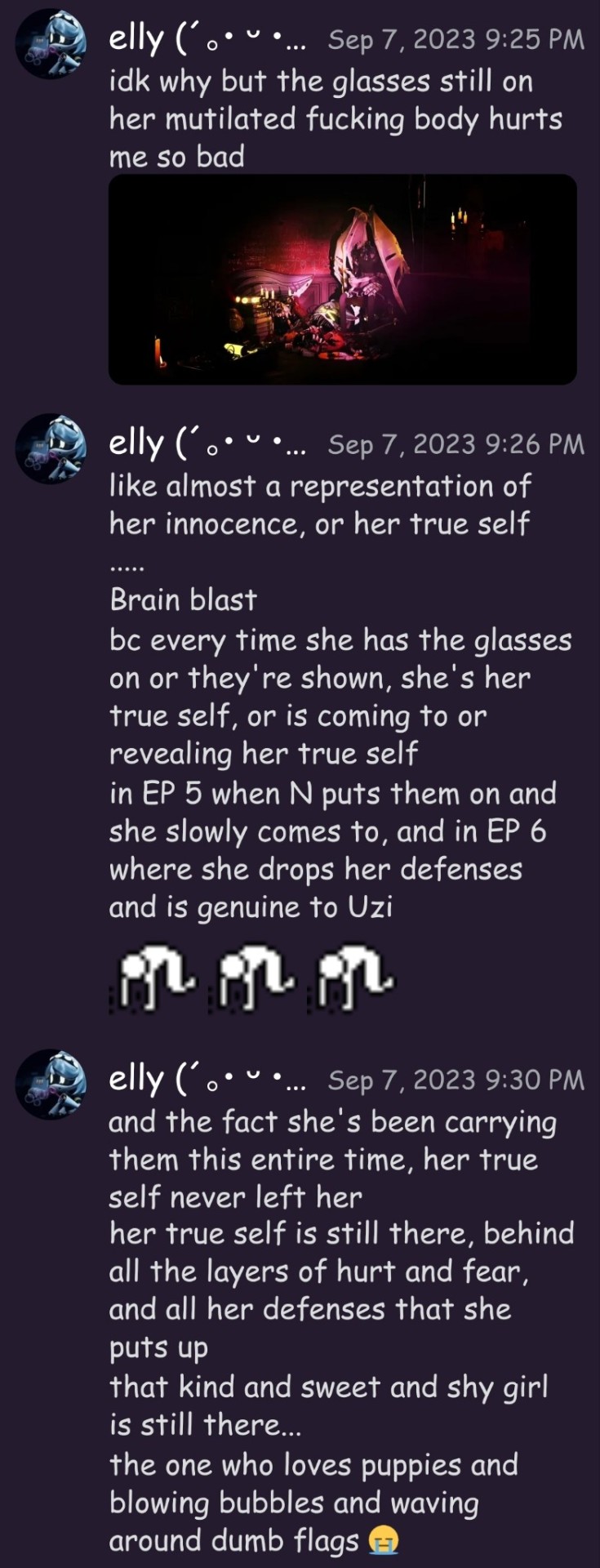

(plain text in read more)
** addendum: when she gets posessed in the middle/end of episode 5, and she's on the ceiling, her glasses fall off, because...gravity, duh.... but it symbolizes the loss of her true self in that moment, as well as telling the audience it's V that got posessed without having a character say it. the loss of the glasses also represents a loss of innocence, as she's actively being traumatized there, since she's still conscious, but unable to control her body as Solver uses her.
after N gives her back her glasses, she comes back to her senses, therefore returning back to her true self.
oh, the glasses she had during the sentinel fight were the same ones she had during her worker drone days by the way, if you look closely at the frames, the damage is the same! she had them this entire time....
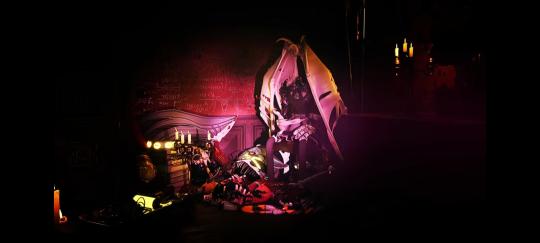
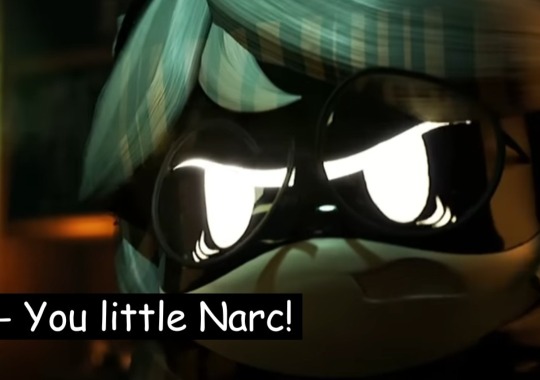
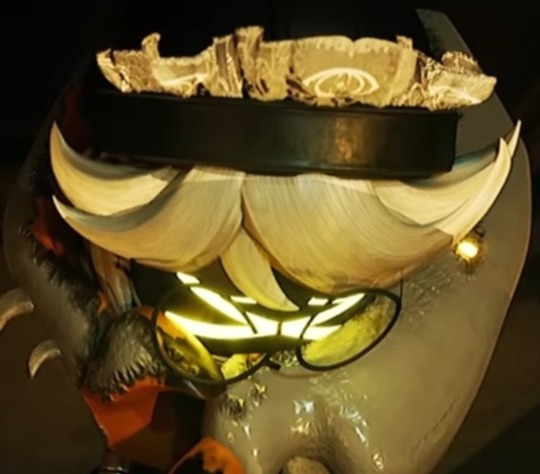
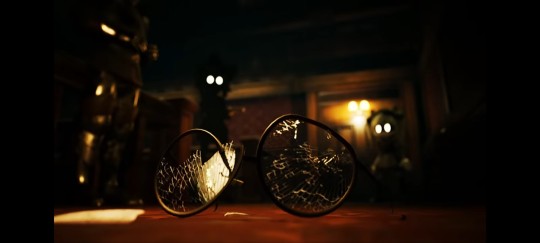

pic 1:
discord message:
idk why but the glasses still on her mutilated fucking body hurts me so bad
like almost a representation of her innocence, or her true self
.....
brain blast
bc every time she has the glasses on or they're shown, she's her true self, or is coming to or revealing her true self
in EP 5 when N puts them on and she slowly comes to, and in EP 6 where she drops her defenses and is genuine to Uzi
(animated emoji of guy slamming the ground)
and the fact she's been carrying them this entire time, her true self never left her
her true self is still there, behind all the layers of hurt and fear, and all her defenses that she puts up
that kind and sweet and shy girl is still there...
the one who loves puppies and blowing bubbles and waving around dumb flags 😭
pic 2:
(replying to previous message i sent saying "ahhh...now that she's lost [her glasses].....")
brain blast..... before she always had them, but she was hiding them on her body, much like she hid her true self in order to protect herself, because she's so scared of everything. But now that she pulled them out and couldn't get them to hide them again, her full self is now always going to be shown, mostly anyway
but the shattering of her glasses means two things:
1) her protective walls coming down, being vulnerable and honest with her friends and teammates
2) her hope and innocence being completely lost. She's in despair. She really, really doesn't think there's any light at the end of the tunnel for her. She's given up. She's given up, and she knows she's either going to be abandoned or die, and that right at that moment, that place of death was the most peaceful option for her solemn scared mind. She would be free from her endless cycle of pain, and her body would be torn apart to never be able to be used agsin. And her teammates no longer care for her, so she's not hurting them by dying in this way, surely. Her and her body are no longer going to be a burden on everyone either. She can finally find peace, her expression at the end is solemn, but in a strange way, hopeful and at peace. Her only hope at that point was to be released from her pain, however.
10.3 hours !!!! 🎉🎉🎉
(referring to the total hours spent literally just ranting about V at that point LOL...it's like at 12 1/2 now)
#fuck u solver i unironically cant stop saying brain blast LMFAOOOO#also V's glasses arent perfectly round#theyre more like errrr droopy downward pointing ovals???#i have similar glasses but theyre pink ive never been more proud to be blind as a bat 💖#v thesis paper#v murder drones#serial designation v#murder drones#absolute solver#murder drones episode 6#murder drones 6#murder drones spoilers#probably my magnum opus tbh#THE TUMBLR APP IS SO NOT IDIOT PROOF IT FUCKED UP MY FORMATTING LIKE TWICE AGH#murder drones theory#md v#chia vent#intelligent words
141 notes
·
View notes
Text
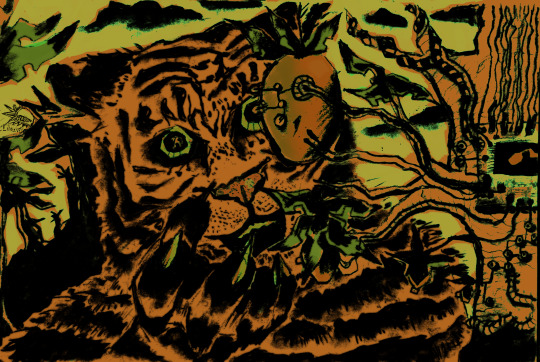
THE ELECTRONIC YET PALEOLITHIC GARDEN OF EDEN BEARING FRUIT UNTOUCHED BY OVERGROWN MEGAFAUNA OF FUTURES PAST
#i havent posted this though ive had it for like two months#ive been forming some kind of world thats similar to the planet of the apes in a way where the meegafauna never got killed off#and they kept developing into more intelligent creatures#until their society reaches a standstill one day when the garden of eden is recreated i think#initial idea was like electronic paleolithic megafauna#im still plagued by images of animatronicc wooly mammoth thats being annasumingly harvested for flesh but instead of meat found#its only wires#and the line between animatronic and electronic and living breathing flesh and fauna becomes blurred#because i guess animals as intelligent creatures would have a different approach to creating a society#i really just want to draw sabre tooth tigers and more neanderthals#well this one isnt a sabre tooth tiger but i didnt think of that yet#i would imagine the animals would evolve alongside the tech actually unlike humans#theres a word for where humans are evolutionary wise where we no longer evolve#anyway ive been wanting to make more art about being trans soo idk but ill keep twirling the idea round my head i think#as well as the water tower knight#art#traditional art#charcoal#mixed media#furry#sci fi#oc#oc art
154 notes
·
View notes
Text

'Thus he ended his speech, and he doesn't say That he had wronged or spoken ill of the king, But he prayed that God long keep the king In life, in happiness, [in honour], and in contentment. And when, to the people in attendance, he said, With a steadfast countenance, "Pray for me," With a firm heart he presented his head To the sharp blade that carried it off in one blow. [And not fearing the great cruelty Of the sharp blade [...] Each one seeing that people bore great grief from it] The [three] who had to die afterwards Said nothing, as if they intentionally Had entrusted Rochford Alone to speak for their conscience [...] [The Queen] was still so curious [...] Therefore, they tell her that her brother had shown The greatest strength of any man ever seen [...] The story of the death of Anne Boleyn : a poem by Lancelot de Carle, JoAnn DellaNeva (Translator, Editor, Writer of added commentary)
"'I will,' he said in a good lawyerly fashion, 'not in this point arouse any suspicion which might prejudice the king's issue.' Unwilling to drop his line of questioning, Hales next claimed that George had spread malicious reports which called into question the paternity of Anne's child, Elizabeth. George did not dignify this with an answer. He knew his own sister." Hunting the Falcon, John Guy & Julia Fox
"But George refused to answer the question with the required yes or no, not wishing, he said, “to engender or create suspicion in a matter likely to prejudice the issue the King might have from another marriage.” Nor would he respond to any suggestion that he had spread a rumour that Elizabeth was not Henry’s. The idea that he believed Elizabeth was not the king’s child and that he had repeated such an untruth was, to George, so contemptible that he would not even dignify it with a reply." The Infamous Lady Rochford, Julia Fox
"George Boleyn's real 'crime' was to be Anne Boleyn's brother and Princess Elizabeth's uncle. He was intelligent and spirited enough to mount a powerful defence of his sister. He was powerful enough to provide the focus for Boleyn followers and, especially, those who would assert Elizabeth's rights as heir to the crown." Anne Boleyn, Josephine Wilkinson
#tsf repeated the line of 'george sealed his own fate' which pissed me off...so much#(yes these are screencaps from tsf. don't @ me)#george boleyn#first of all; george's fate was already sealed. so#secondly; i feel like that report from chapuys has been...misinterpreted; possibly?#(unpopular opinion forthcoming): i don't think he repeated what was written on the accusations he was brought#to humiliate henry (although probably this was a bonus)#i think it was more a matter of... he wasn't going to allow them to accuse him of having said something ('not even more replied better')#that they refused to read into the record. and accountability and possibly more a way to give one last blow to cromwell#vis a vis humiliating henry. which is part of why wulfhall was so infuriating#that it was portrayed as cromwell 'tricking' george into doing so.#because the next part (oft omitted which is why i've included it above) is that he won't say anything to impugn the king's issue.#and the NEXT part is to accuse him himself of having spread rumors elizabeth wasn't the king's child#and why would he do that. even his enemies admitted his intelligence#(christopher hales was very closely connected to cromwell and george would've known that if he fucked up it would reflect on cromwell and#thus infuriate henry)#as for his last speech; i wish he was given the credit that anne is given and deserves#which is that his final words were to protect his remaining family#but yeah. so much interesting in de carles. these men being fortified by notcing the crowd was grieving them; not exulting in their ends.
31 notes
·
View notes
Text
I take 'Aligned Grimlock doesn't seem to actually less intelligent despite nearly 99 percent of his processor's energy being forcibly rewired into muscle power' and raise you 'that IS what is happening, but Grimlock is just so dang smart that he mostly suffers some mild speech issues despite functionally suffering a nearly complete lobotomy'
#queued#transformers#fall of cybertron#grimlock#i think there's probably some interesting meta to be mined with#the idea of exploring Grimlock used to be significantly more intelligent until Shockwave took a carving knife to his brain#and he's aware of this#its hard for him to think now#words and thoughts jsut feel so SLUGGISH and its severely messed up his chemical balances#to mix metaphors a bit#and this feeds into his rage even more because he feels deep down#he's lost the person he was and he can't ever get himself back#i would like to suggest Grimlock originally having been more similar to G1 Wheeljack before this point#with elements of his existing character#or alternatively if you want to believe RID2016 Grimlock IS the same Grimlock#possibly after a rebirth of some kind#he's gotten the alterations partly reversed so he's not as strong as he was nor as brilliant but#he's at least found some kind of peace
13 notes
·
View notes
Note
https://www.tumblr.com/skullsandcorals/738285799236321280/im-dyslexic-im-not-stupid
1. Holy shit I am so happy I found another person who gets how smart Percy is, and gets that every instance of Percy looking/getting called stupid is due to his dyslexia or people not telling him anything.
2. Which book/chapter is this from? I need to bookmark it ASAP and start shouting it from the metaphorical tumblr hills.
3. We really don't talk about how good a mom Sally is? Like yeah she's badass and gentle but like. She respects Percy. When the school system failed Percy, she's the one who still not only believed that he was smart but still acted like it and probably taught him too. Queen mom Sally Jackson right there.
1.) YEAHH EXACTLY. Or his ADHD 😭 It drives me NUTS whenever Percy is treated as the dumb + comedic guy. Like I get what they're saying and why they're saying it, but sometimes his character gets reduced to JUST that and it hurts my soul. I get that he's funny as a narrator and as a character and sometimes he can be a little "clueless" but it just feels like some people like to think of that as either all he is or a huge part of who he is. I believe I've also seen Leo get this treatment despite literally being insanely smart at such a young age so. that's...fun. They can be funny and smart too 😞
2.) It's from the 10th Anniversary edition of The Lightning Thief! It's Rick's cover letter for the first readers of the manuscript & a note from the narrator. I don't have a copy of that edition myself, but I've seen some pictures of it on Rick's blog and someone posted one of the pages on Reddit (where I got it from).
Here's the full page from Reddit (source) & the picture from Rick's blog where the page is visible (source):
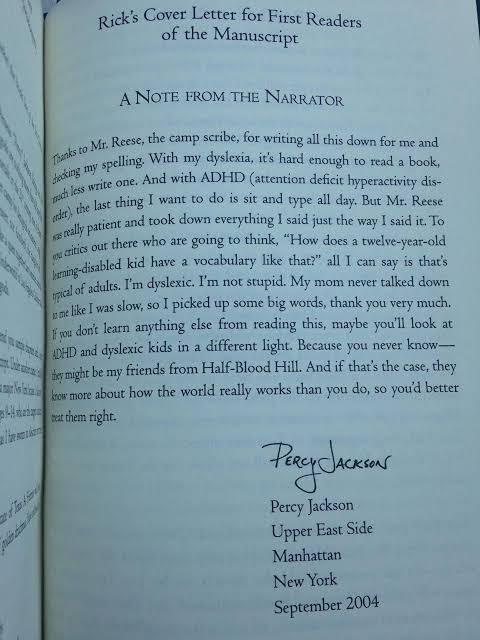

3.) YEEEAHHHH I LOVE HER SO MUCH!!! What I would do to get adopted by her rn. The way she talks to him makes me kinda teary-eyed because she's just so...you can just tell how much she loves Percy and that she would do anything to make sure he grew up resilient and kind in a world that's always out to get him. She believes in him so much that it just makes me lose my mind a little. It's just so sweet and I can't help but feel so moved by it.
I'm not sure if you've read Chalice of the Gods, but there's this scene where (spoilers, kinda) Sally talks to Percy after the whole thing with Hebe and honestly this scene makes me want to sob and cry and weep
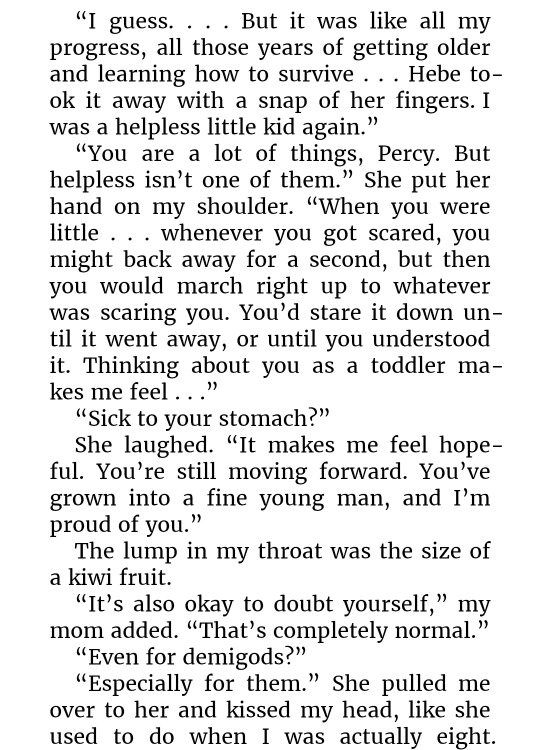
“You are a lot of things, Percy. But helpless isn't one of them.”
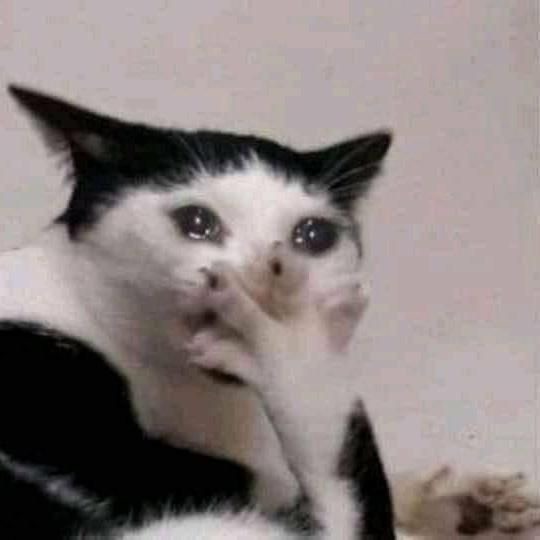

#personal mail ♡#long post#pjo/hoo#percy jackson#sally jackson#percy jackson and the olympians#the lightning thief#chalice of the gods#don't get me wrong tho. i know percy can and had acted clueless or oblivious or whatever.#but my gods. at least think about it for a hot second.#adhd + dyslexia + people just not telling him shit + other characters treating him like he's stupid + gods know what else#i wouldn't have said anything if they were just talking about the book#and about that one specific scene where percy called his teacher an old sot#because he did admit he did not know what the hell that meant.#but c'mon :/. percy will say anything relatively smart and people will discredit the shit out of his intelligence and knowledge 💀#has acted*** just ignore any typos I'm sorry 😭#the impertinent thing isn't even that big of a deal 😭 it's like...one relatively “big” word. but gods forbid right 💀#but anyway I love sally she's great and awesome and no she is not perfect but she sure tries her damn best to be who Percy needs her to be
63 notes
·
View notes